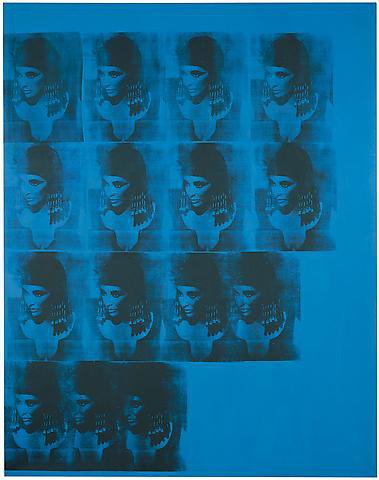Andy Warhol
dal 15/9/2011 al 21/10/2011
Segnalato da
15/9/2011
Andy Warhol
Gagosian Gallery - West 21st Street, New York
An exhibition of the late Elizabeth Taylor portraits. Warhol made over fifty portraits of her in all her incarnations, from the ethereally beautiful child-actress (National Velvet, 1963) to the commanding, voluptuous screen goddess (Blue Liz as Cleopatra, 1962). The personification of charisma whose highly public life charged with drama, tragedy, and romance, this iconic muse was a perfect vehicle for Warhol's vivid silkscreen portraiture derived from press clippings, publicity shots, and film stills.

She was unquestionably gorgeous. I can think of no other word to describe a combination of plentitude,
frugality, abundance, tightness. She was lavish. She was a dark unyielding largesse. She was, in short, too
bloody much.
--Richard Burton
Gagosian Gallery is pleased to present an exhibition of portraits by Andy Warhol of the late Elizabeth
Taylor.
Frequently hailed as the greatest movie star of all time, Taylor was a friend of Warhol’s in the 1970s and
1980s. The personification of charisma whose highly public life charged with drama, tragedy, and romance,
this iconic muse was a perfect vehicle for Warhol’s vivid silkscreen portraiture derived from press
clippings, publicity shots, and film stills.
From her early years as a child star with MGM, Taylor became one of the world's most famous actresses,
recognized first for her acting ability, her glamorous lifestyle, her beauty, her husbands, her jewels, and her
violet eyes -- and later as a courageous and tireless social activist. Warhol made over fifty portraits of her
in all her incarnations-- from the ethereally beautiful child-actress (National Velvet, 1963) to the
commanding, voluptuous screen goddess (Blue Liz as Cleopatra, 1962).
In single portraits such as Silver Liz [Ferus Type], (1963) and Liz #6 [Early Colored Liz] (1963) Taylor
appears isolated on a monochrome field, a Russian icon reinterpreted for the altar of celebrity. Flawlessly
coiffed jet hair frames her startling face; her full red lips “bleed” beyond their outline onto the canvas; her
skin glows in flagrant shades of pink while her legendary eyes gain a new level of theatricality from the
vivid turquoise that highlights her brow. In other works, Warhol’s palette moves from the lurid apple green
of Liz [Early Colored Liz] (1963) to the gleaming sterling of Silver Liz [Studio Type] (1963). Brought together
for the first time, each portrait captures and amplifies the intensity, the extravagance, the carnality, and the
resilience that were the unique hallmarks of Elizabeth Taylor’s notorious and beloved character. Warhol’s
choice of source material and his daring palette produced images that have lost none of their explosive
power in the decades that separate the present from the moment of their making.
Andy Warhol (1928-1987) is widely regarded as a defining figure not only of the Pop Art movement of the
1960s but of an entire cultural era. He worked prodigiously across a vast range of media, including painting,
photography, print-making, drawing, sculpture, film (sixty experimental films between 1963 and 1968),
television (“Andy Warhol's TV,” 1982 and “Andy Warhol's Fifteen Minutes,” 1986), publishing (Interview
magazine and various books), happenings, and performances. He also endorsed products, appeared in
advertisements and made business deals, giving new currency to the philosophical and practical interplay
between art as a reflection upon society and art as a product of society.
Image: Blue Liz as Cleopatra, 1962. Acrylic, silkscreen ink, and pencil on linen, 82 1/2 x 65 inches (209.6 x 165.1 cm). Daros Collection, Switzerland © 2011 Andy Warhol Foundation for the Visual Arts/ ARS, NY
For further press inquiries, please contact Virginia Coleman at virginia@gagosian.com or at 212.744.2313.
Opening reception: Friday, September 16th, from 6 to 8pm
Gagosian Gallery
522 West 21st Street - New York
Tue – Sat: 10:00am– 6:00pm



